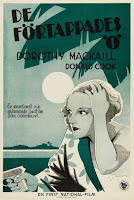Bright Lights is a film that really doesn't know what it wants to be - it has romance, mystery, nudity (in silhouette), rape, violence, murder, AND music! Interspersed throughout the film are musical number, most of them repetitive. There is, however, a unique musical interlude - a VERY strange song celebrating cannibalism. In spite of all of this, it's a short film - only 69 minutes (thank heaven!).
Dorothy Mackaill is wasted in this movie. She is so much better than the film. While she was part of the original casting, she was eventually elevated to star billing, with Frank Fay downgraded to co-star billing (AFI catalog). She does get to sing (she has a pleasant, throaty voice) and dance (in that rather all-legs style of the early 30s), but her plot-line is slim. She's trying to keep her fiance from running off, while still hinting to the audience that she has feelings for her co-star. She more or less succeeds, but I think the viewer would have wondered why she was wasting her time with either of them. (The film is briefly touched on in this New York Times article on Dorothy Mackaill's films).
Much of our discussion focused on Frank Fay. A highly-paid personality on the New York stage, Fay was lured to Hollywood with a tidy contract. It quickly became apparent that whatever talent he had did not translate to the screen. It also didn't help that he was a fairly despicable man - a racist who made his antisemitism well known. An oft-repeated story involves an altercation with Milton Berle. Fay was on stage at the Palace, and Mr. Berle was watching from the wings. When Fay shouted an ethnic slur in Berle's direction, Mr. Berle hit him with a stage brace. Sympathy was on Mr. Berle's side (The Comedians: Drunks, Thieves, Scoundrels, and the History of American Comedy by Kliph Nesteroff). But Mr. Fay had one ace - he was married to the up-and-coming Barbara Stanwyck, who was highly regarded and loved by all who worked with her. As Ms. Stanwyck's star rose, however, Fay's plummeted (It's been suggested that their marriage was the basis for A Star is Born (A Life of Barbara Stanwyck: Steel True 1907-1940 by Victoria Wilson)). Mr. Fay drank more heavily, became abusive to his wife, who finally left him when he threatened their child. He made a few movies in the 1940s, but his film career was essentially over. He would return to Broadway in 1944, when he starred as Elwood P. Dowd in the Broadway premiere of Harvey. (The film role would, of course, go to James Stewart. This January 8, 1945 issue of Life magazine featured an article about Fay's life.) But Harvey was pretty much the end for him. He died in 1961.
One reason to watch this film is to see a sound film featuring Noah Beery, Sr. The father of Noah Beery, Jr. (of The Rockford Files fame) and brother of Wallace Beery, Noah, Sr. had an extensive silent film career. He began his career in vaudeville. By 1915, when he ventured out to Hollywood, he had already appeared in one short; he proceeded to appear in over 200 films primarily in character parts. He was the original Sgt. Gonzalez in the 1920 The Mark of Zorro and Tabywana in Cecil B. DeMille's The Squaw Man (1918). When his son began a film career, Mr. Beery billed himself as Noah Beery, Sr. He was visiting his brother (for Wallace's birthday) in 1946 when he suffered a fatal heart attack - the brothers were planning a Lux Radio Theater broadcast of "Barnacle Bill" in which they would have appeared together. You can hear a rehearsal tape here.
Frank McHugh also appears as the newspaper reporter, Fish. The character is, for the most part, annoying, but his part is pivotal to the action. Also appearing in a bit part (as a photographer) is John Carradine. He's unbilled, so you have to look hard to see him.
A later of the release of the film would re-title it Adventure in Africa (probably because of the short incident with Parada. The new title makes absolutely no sense). It's a pretty awful movie (as was noted by my colleague at Pre-code.com in his review). There are just too many musical numbers and not enough a story. However, for a look at Noah Beery, Sr. and Frank Fay, this might be worth an hour of your time (you can always fast forward through the numbers). We'll leave you with this clip from the film.





















